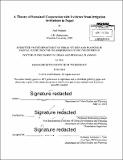A theory of sustained cooperation with evidence from irrigation institutions in Nepal
Author(s)
Pokharel, Atul
DownloadFull printable version (13.02Mb)
Other Contributors
Massachusetts Institute of Technology. Department of Urban Studies and Planning.
Advisor
Bishwapriya Sanyal.
Terms of use
Metadata
Show full item recordAbstract
Why do some locally based institutions for using and managing shared resources survive, adapt and continue to perform well in the face of changing circumstances while others decline and disappear? To answer this, I revisited 233 irrigation canals in Nepal, originally used to illustrate the Common Pool Resource Framework, between 16 and 37 years later. The resulting longitudinal dataset with 509 variables, plus 39 randomly selected cases called for a different explanation of why only some of these paradigmatic institutions sustained cooperation over decades of rapid and multidimensional changes to keep their canals functional. Analyzing 827 interviews with canal users revealed a difference between the reasons of one considering committing to an institution, and one considering whether to change their existing commitment. Focusing on the latter revealed two variables relating to institutional performance over time: how fair the users perceive the institution to be, and how flexibly the rules are applied. Furthermore, the relevance of perceived fairness relates to government assistance; flexibility is bounded by the resource's technical needs; and the relationship of flexibility to institutional performance depends on perceived fairness. These patterns appear in the original data, the newly collected data, and in the changes between the two. The resulting theory of sustained cooperation is consistent with these empirical findings. It predicts that the adaptability of institutions for using and managing shared resources depends on the qualities of cooperation or non-cooperation with the rules. These are characterized by perceived fairness and bounded flexibility. Overall, I find that institutional performance over time depends on how the rules fit the users' sense of fairness as well as the specific features of the resource and its environment. This differs from current explanations in three ways. First, it broadens the analytical focus beyond interpersonal cooperation to include cooperation between users and the institution over time. Second, it recognizes that perceived fairness of an institution's rules is a determinant of its adaptability and performance over time. And third, it identifies the conditions under which flexibility or rigidity of rule application can contribute to institutional adaptability in changing circumstances.
Description
Thesis: Ph. D., Massachusetts Institute of Technology, Department of Urban Studies and Planning, 2014. Cataloged from PDF version of thesis. Includes bibliographical references (pages 202-211).
Date issued
2014Department
Massachusetts Institute of Technology. Department of Urban Studies and PlanningPublisher
Massachusetts Institute of Technology
Keywords
Urban Studies and Planning.